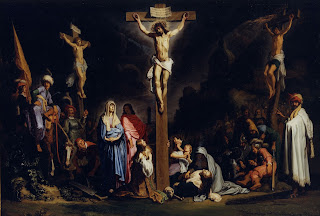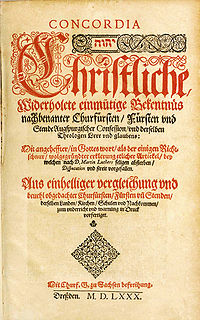The
Voice of One Crying in the Prison
Based
on Matthew 11:2 – 11
Dear
beloved children of God who suffer: grace, mercy, and peace to you
from God the Father and our Lord and Saviour Jesus Christ. Amen.
John
the Baptist is a hero of the faith. Before John was even born he
rejoiced when Jesus was near. He leapt with joy in his mother’s
womb when Jesus, also carried in His mother’s womb, came to visit
[Lk. 1:39 – 45]. John’s ministry was foretold by Old Testament
prophets [Is. 40:3 – 5, Lk. 3:4 – 6], and his birth was announced
by an angel to his father [Lk. 1:11 – 20]. He had a miraculous
birth, born to a couple too old to have children, and his mother
being barren. John’s father was even given a sign by the angel
concerning the prophecy of his birth – he was mute until John was
born.
John,
the forerunner who prepared the way for Jesus, was filled with the
Holy Spirit from his mother’s womb. He baptized Jesus in the
Jordan River, saw the Holy Spirit descend on Jesus in the form of a
dove, and heard the voice of God the Father announce from heaven,
“This is my beloved Son, with whom I am well pleased [Mt. 3:13 –
17].” John proclaimed the One to come, the One greater than him.
He preached repentance, telling people to turn away from their sins
in preparation for the coming of the mightier One.
Jesus
asks, “What did you go out into the wilderness to see? A reed
shaken by the wind?” Certainly not. This hero of the faith was
not like a reed swayed by public opinion and societal pressures. He
preached God’s Word whether the hearers liked it or not. And his
preaching of repentance was not exactly liked by everyone. Herod,
the ruler of Galilee, had divorced his wife and taken Herodias, his
brother’s wife [Lk. 3:18 – 20]. Others around Herod accepted his
adulterous life, but John preached God’s Law to Herod as he did to
everyone else, without fear of consequences. He was not a reed that
bends to the fear of man, even a man as powerful as Herod.
John
the Baptist was an unswerving preacher of God’s Word. A steadfast
teacher of the truth. The crowds came to him to ask him, “What
should we do [Lk. 3:10]?” Tax collectors and soldiers came to him
and asked him, “What should we do [Lk. 3:12, 14]?” People came
to John for answers, and John always had them. He would point them
to God’s Word: this is the will of God; walk this path. He had
many disciples that followed him, but he continually pointed them to
Christ – saying He is the One. I am not worthy to untie His
sandal.
This
hero’s life work was pointing to Christ. And he gave up much in
order to do it. “What then did you go out to see? A man dressed
in soft clothing? Behold, those who wear soft clothing are in kings’
houses.” John the Baptist gave up a life of comfort that he might
have had as the son of the high priest Zechariah. He gave up soft,
rich clothing, for garments of camel’s hair. He gave up luxurious
foods for locusts and wild honey. He was resolute in what he
believed and what he taught. There was no uncertainty. He pointed
to Christ and said, “Behold, the Lamb of God, who takes away the
sin of the world [Jn. 1:29].”
But
then, something happened which John did not anticipate. His
preaching of repentance to Herod because of Herod’s adultery landed
him in prison. His preparing the way of the Lord resulted in his
loss of freedom. He was confined to a small, dark dungeon. He was
left alone, without the crowds that followed him, without his
disciples.
John
was shocked. This wasn’t supposed to happen. He was waiting for
the coming kingdom of God, the deliverance of God’s people, the Day
of Judgment on those who opposed the Messiah’s kingdom. “Even
now the axe is laid to the root of the trees,” he had preached [Mt.
3:10]. Christ’s winnowing fork is in His hand to collect His wheat
into the barn and cast the chaff into unquenchable fire [Lk. 3:17].
How is it possible that Herod can have John the Baptist cast into
prison? How is it possible that the one who prepares the way for the
Judge of the living and the dead is cast into prison by this this
adulterous chaff?
Here
in the jail cell, John sees no sign of the deliverance of God’s
people, no sign even of his deliverance from prison. This is where
doubt sets in. This is where the devil attacks, when John is at his
weakest. He begins to question, is Jesus the One? Is He truly the
deliverer, or is there someone else? If Jesus is the Messiah, why
would I be suffering here in prison? If Jesus is the deliverer, why
has He not come to deliver me? So he sends his disciples to ask
Jesus, “Are you the one who is to come, or shall we look for
another?”
How
does Jesus respond? In anger? “Did you not see the Spirit descend
on me in the form of a dove? Did you not hear my Father’s voice
from heaven? Did you not yourself point to me and say, ‘Behold,
the Lamb of God, who takes away the sin of the world?’” No, this
was not Jesus’ response – He responds with words of comfort.
And, in fact, Jesus starts to praise John, saying he is greater than
a prophet, the greatest born of women. What a response considering
the doubt evident in John’s question to Jesus.
But
having faith, we still sometimes doubt. We often have many doubts.
We sometimes doubt God’s guidance in our lives. We doubt if His
will is really good for us. If God wants what is best for me, why am
I suffering such a horrible illness? If God loves me, why did my
spouse leave me? If God is real, why would He allow me to lose my
job? This week, there are many parents in Connecticut asking why God
would permit their children to be massacred. We sometimes doubt if
God even hears our prayers. We feel alone as if we are the only ones
who suffer doubt. Ashamed of our doubts, we start to question
whether we believe at all, whether God is even real.
Doubt
lives in us as long as we have this flesh, as long as we have our
sinful nature. Faith is not absence of doubt, but it is trust in
Christ even amidst doubt. Faith does not mean we never fear, but in
spite of fear and doubt, faith clings to Christ’s promises.
This
is why Jesus praises John in his doubt. John did not trust what he
saw in the prison. He did not believe his feelings of doubt, but he
sought to hear the Word of Christ. He sent his disciples to ask
Jesus if He was the One who is to come. This was an act of faith.
Faith wants to hear God’s Word; unbelief wants to be far from God’s
Word. John sought assurance in the only place it can actually be
found. He wanted Jesus to send His Word to him. He wanted to hear
God’s Word to strengthen his faith in the midst of overwhelming
doubt.
John’s
question is a question we need to learn. When you are in trouble and
suffering, look past your jail cell of grief. In your trouble, call
on Jesus, flee to Him for refuge. Ask Him, “Are you the victor
over my suffering?” Ask him, “Will you get me through this
difficulty, will you be with me?” In temptation ask him, “Are
you the Lamb of God who takes away the sin of the world?”
In all
these situations, Jesus wants to send His Word to you. He will
respond. See Jesus’ response to John. Jesus gives John His Word,
quoting two passages from Isaiah, “The eyes of the blind shall be
opened, and the ears of the deaf unstopped [Is. 35:5],” and “the
poor have good news preached to them [Is. 61:1].” Jesus sent the
best thing possible to John – He sent His Word. He sent His Word,
which answers John’s anxious heart whether or not He is the one who
is to come, by saying, “I am.” Isaiah writes that the very
purpose of these words is to comfort the anxious heart, and this is
exactly Jesus’ purpose in sending them to John. Jesus says, “I
am who I am. I fulfill the prophecies of the Messiah. I preach the
good news of salvation also to you.”
Very
interestingly, Jesus does not carry on with the passage in Isaiah,
which continues, “He has sent me… to proclaim liberty to the
captives, and the opening of the prison to those who are bound [Is.
61:1].” Jesus does not speak these words that might lead John to
hope for release from prison. Instead, Jesus adds a phrase that does
not appear in these passages of Isaiah. He told John’s disciples
to tell him that the dead are raised up. Jesus does not point John
to hope that suffering and affliction will disappear in this life.
Here Jesus says directly, “Death does not separate you from me. I
am the Lamb of God who takes away the sin of the world. Whatever
hardships you may face, even death, you will be raised up to the
eternal bliss of heaven.” With Jesus’ response, with His
promise, John could wait even for Herod’s soldiers to come and
behead him, in his last moments, clinging to the promises of God,
knowing that Jesus will never leave him or forsake him.
There
is only One who has ever been forsaken by God in the midst of
suffering. There is only One who received no answer to His words of
groaning, and was not rescued despite His trouble. He cried out, “My
God, my God, why have you forsaken me?” Jesus was forsaken by His
Father so that you will never be! He suffered to take away your
suffering. His bitter sufferings and death were for your sake, so
that God will be gracious and merciful to you.
And
God says, “I will never leave you nor forsake you [Heb. 13:5].”
He will not leave you to fend for yourself. His love, which forgives
you all of your sins, gives you the assurance of a future rescue from
all afflictions. Even amidst pain and suffering, God’s Word gives
you life, and assures you of future joy with Him in eternity. These
are Christ’s words that He sends to you, to which you can cling to
comfort your anxious heart. Amen.
May
the peace of God, which comforts our troubled hearts, keep us in
Christ Jesus our Lord. Amen.






